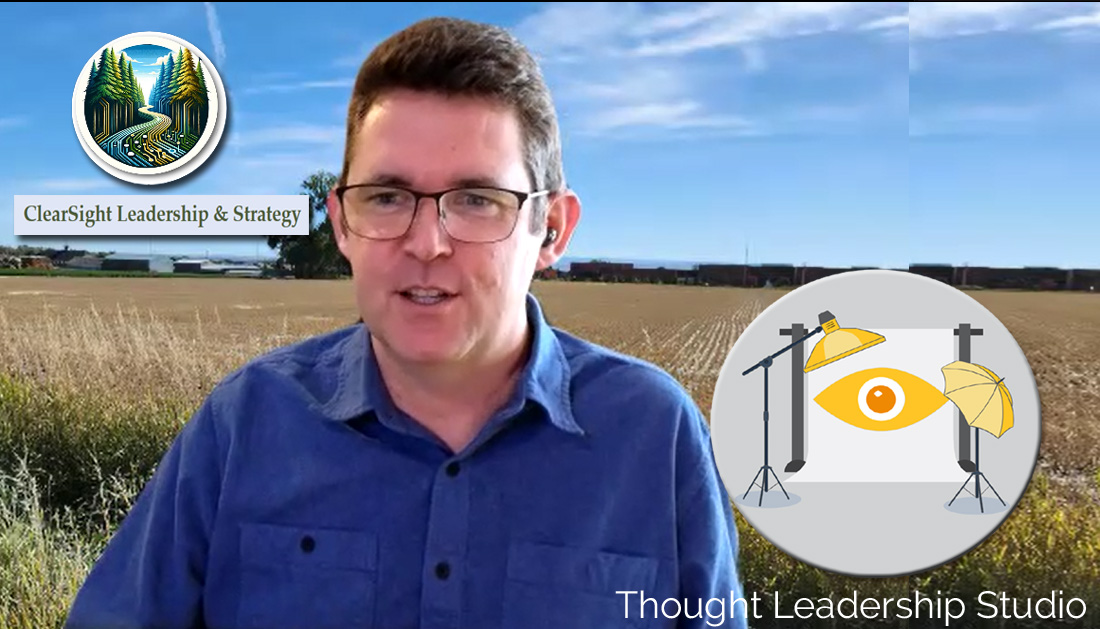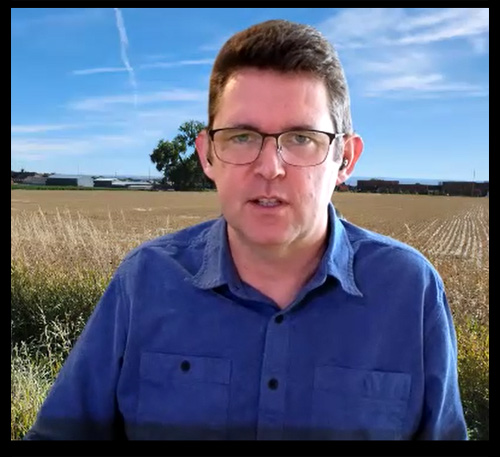Thought Leadership Studio Podcast Episodes:
Cultivating Inspirational Leadership with Mark Nitz
Episode 71 - Shaping the Future of Work: Insights on Autonomy, Knowledge Management, and Decentralization from ClearSight Leadership

#consulting, #inspiration, #interviews, #leadership, #management, #paradigmshifts, #philosophy, #systemsthinking, #thoughtleadershipexamples
Or Click here to listen or subscribe on appWhat this episode will do for you
:- Mark Nitz's Leadership Philosophy: Uncover the foundations of Mark Nitz's leadership approach, exploring how ClearSight Leadership aims to transform traditional leadership dynamics through empathy, strategic alignment, and cultural innovation.
- Redefining Leadership for Modern Challenges: Dive into Mark's perspective on the essential shifts needed in leadership mentality and practices to meet the complexities of today's organizational and societal challenges.
- Empathy and Strategy in Leadership: Learn about the critical role of empathy in strategic leadership, how it informs decision-making, and the process of aligning leadership strategies with organizational culture and values.
- Overcoming Obstacles in Leadership Evolution: Understand the common barriers to evolving leadership and organizational culture, from entrenched belief systems to resistance to change, and how to navigate these challenges.
- Innovative Approaches to Corporate Culture: Discover Mark's insights on transforming corporate culture by prioritizing personhood, inspiring work environments, and fostering a sense of belonging and purpose among employees.
Mark Nitz
In this interview, I speak with Mark Nitz, the founder of ClearSight Leadership and Strategy, about the concept of inspirational leadership.
Mark explains that his mission is to redefine leadership and help organizations inspire their employees. He emphasizes the importance of developing a strong leadership culture and aligning leadership skills with a formal strategy. He also discusses his personal journey that led him to focus on inspirational leadership, including his experiences with workplace bullying.
Nitz believes that outdated belief systems, such as the idea that business is not personal, need to be challenged in order to create a culture that values and inspires employees.
Mark suggests that leaders should focus on clear communication of purpose and direction, decentralization of decision-making, and creating an environment that fosters innovation. He also provides practical steps for consultants, coaches, and business leaders to implement these ideas in their organizations.
Some of Mark's coordinates:
Curated Transcript of Interview with Mark Nitz
The following partial transcript is lightly edited for clarity - the full interview is on audio. Click here to listen.
Chris McNeil: I'm Chris McNeil, with Thought Leadership Studio, and I'm sitting here across Zoom with Mark Nitz, the founder and principle of ClearSight Leadership and Strategy. Welcome, Mark.
 Mark Nitz: Good afternoon. Pleasure to be here.
Mark Nitz: Good afternoon. Pleasure to be here.
Redefining Leadership: Empathy, Strategy, and the Human Element in Business
Chris McNeil: Pleasure to have you. I love what I'm seeing in your work. It looks like it has a lot to do with inspirational leadership, which to me is above and beyond what leadership is typically thought of. But can you kind of explain that distinction to me? What makes your mission, what makes you do with your clients, those you work with a journey where you're redefining leadership, as I'm reading from your site here, and redefine leadership and witness organizations - I like that word witness by the way - that don't just succeed but truly inspire.
Mark Nitz: Some of the critical elements there are that we're looking to develop a better culture and taking the concept of leadership culture and providing a little bit of improvement to teach leaders how to be empathetic or teach people how to communicate better to a level of aligning those skills and capabilities with a formal strategy.
And that formal strategy really plays out because of the vitality of a strategy and strategy being about whether or not people are inspired to win, whether or not you're going to come out on top and putting those leadership skills, actually improving those leadership skills beyond just what you hear in the current standard language.
 Oh, you need to communicate better. Oh, we need resourcing and things like that. But rather the how-tos of all that leadership and really learning in depth about your people, where their motivation comes from, which is entirely driven by the person and how you can actually engage both personally and with their background, their experience in life to inspire alignment with your strategy, with what you want done. And a lot of that comes down to how you lay out the entire playing field and not just whether or not you have one or two better skills.
Oh, you need to communicate better. Oh, we need resourcing and things like that. But rather the how-tos of all that leadership and really learning in depth about your people, where their motivation comes from, which is entirely driven by the person and how you can actually engage both personally and with their background, their experience in life to inspire alignment with your strategy, with what you want done. And a lot of that comes down to how you lay out the entire playing field and not just whether or not you have one or two better skills.
Chris McNeil: That's quite a deliberate and in-depth answer, and I love it. So to give our listeners a little context about where you're coming from and what you're trying to do, why don't we step back and if you could share what set you on the path you're on now.
Was there a pivotal moment that set you off on this course of inspirational leadership development that you're doing now? Or what's your story that brought you here that would be meaningful to the work that you're doing now?
Mark Nitz: There are several, and they're very distinct, though you don't have to read my whole history, like War and Peace or the rising Fall of Rome in order to understand it, I had a fair bit of experience with workplace bullying over the course of the years, and that actually started with my first professional experience.
And over the last two plus two and a half decades, what I've noticed is that those behaviors are pervasive and oftentimes they are dismissed as, oh, that person takes things too personally, which I consider kind of the motto of the workplace bully. And when an organization prioritizes that kind of attitude towards the people who bring value, there's a problem. And I think we all know it inherently. We can feel it when things are wrong because we're a social animal. There's something about our brains that says this is a problem.
But in the 21st century workplace, we're still taught that we should tamp down that feeling, that concern. And I think it's the source of a lot of workplace anxiety. It's the source of a lot of fear. It's the source of a lot of failure, frankly. And so I decided to a look into where some of these traits come from. Look into where some of these beliefs come from in the modern workplace, but also dig into my own experience with it and align the two when you're working with somebody who's willing to scream and yell at you and then turn around the next day and say, well, I just want you to get to be a better professional.
So that's definitely not leading by example. It's definitely not doing any good for me feeling valued as a staff member or as a person, something's wrong. And so I aligned those experiences with, and the history of those concepts with what I believe to be true from a virtue perspective, that we're all human, we all have life experience in some way, shape or form.
And at their core, those two things alone shape a lot of what we bring to the workplace. And it's not that having 20 plus years worth of experience in a particular area of a business means that you know better. But having lived a life, you've experienced a lot of things that make you unique. You're going to have some concepts, some ideas, some notion somewhere along the line that is truly valuable to the organization and that aligns with your motivation.
So what I did was I packaged all that stuff up and I said, and I asked myself, what is a very brief description of what I'm looking to do with this info? And the very brief description is I'm looking to flip these corporate notions, these long lasting myths on their head. The workplace is about people. Every decision that's made in the workplace is made by a person.
You cannot extricate yourself from that personhood and to use that line to say, oh, it's just business. It's not personal, is not only ancient, it's like that's a hundred year old phrase, but is to say, I do not value the personhood of the person standing here that I'm telling to just let it be or let me make the decisions.
It's an autocratic attitude essentially.
From Old Myths to New Realities: Transforming Organizational Beliefs for Better Futures
Chris McNeil: It's denying the deep resources that personhood brings to the table.
Mark Nitz: Precisely, precisely. And if we can dispel that myth and rebuild the understanding of corporate culture, of organizational culture based around people, based around the knowledge that these people bring immense value and they already want to be here, we're actually going to find over the course of the next 10 to 15 years that our productivity goes up, the value of our products goes up, the commitment of our customers and our clients to our organizations and our companies goes up.
Because again, it goes back to we are a social animal, we are a gregarious creature. And those are the sorts of internal organizational treatments of people that fan out that will have that pay it forward effect. And the bottom line piece of that example or story is that when someone goes to leave your organization, if you've done everything you can for them as a person, for them as an employee, and they're going to look for a step up in their career somewhere else, and you've helped them do that, that's the, I guess, cultural influence that you're going to have that is going to be part of your reputation as an organization.
If you don't do that, your reputation is the inverse that this person had to leave because they were not well cared for. They were not treated well, they left because there weren't opportunities.
Chris McNeil: And this is because of outdated belief systems.
Mark Nitz: It is, yes.
 Chris McNeil: Yep. What are some of these outdated belief systems and what are their counterparts? ... The new belief systems that you're looking to lead them to?
Chris McNeil: Yep. What are some of these outdated belief systems and what are their counterparts? ... The new belief systems that you're looking to lead them to?
Mark Nitz: A great question. I've got some bullet point answers and they're bullet point because they need to be really, really clear. Number one, "it's not personal, it's business" or "it's business. It's not personal." That's a hundred years old. In fact, I think it was a hundred years old a year ago. And it's something that's been pervasive because it's useful to a corporation trying to suck productivity out of their people, not because it has to do with people.
No organization is built without people. If you're a small business owners, a small business leader, even if you're a one person show, your organization exists because there are people to make it exist. So it can't be, there is not yet AI for running businesses. Everything that comes from your business, your organization has to do with ideas that come from people. Another notion you can't choose your boss.
In the last five or so years, we've started to prove that wrong. You can in fact leave an organization and go find someone to work for that you enjoy working for. So that's another platitude that I think needs to be left to the side. And then the one that I mentioned initially in the chat is the "don't take things so personally" approach - again, that's the model of the workplace bully.
And I agree, it's one thing to have emotional breakdowns in the middle of the office, but to be emotional, to have passion, to have that motivational tie to what you're doing in the workplace is good. We don't want you to be an automaton. We want you to be passionate about what you do and what you believe about it.
Chris McNeil: So you think these beliefs might be relics of industrial age business design, where the first factories, where people were basically treated as machines do very simple task and correct. You could treat them as "machines" because they're acting as machines. But now we live in a knowledge society. Now we live in information society.
Mark Nitz: Yes.
Knowledge Management and Worker Autonomy: Keys to Modern Business Success
Chris McNeil: ... Now we have knowledge workers who have autonomous goals within organizations that need to be unleashed. And that thinking is obviously extremely outdated, but it's still everywhere, isn't it?
Mark Nitz: It is. And the knowledge based piece I think is also really important because that's actually part of our step in the right direction is there are two fundamentals now that I think are, well, they're fundamentals now. They weren't 25 years ago. What's in it for me? Which is a really good step that I think needs to be expanded upon.
And then actual formal knowledge management, which is I think a key. A lot of people are aware of managing knowledge. How do we make sure that we know what this person who's about to retire knows? How do we maintain that institutional knowledge?
We can further that with a formal knowledge management system that I think businesses really need to consider as a truly formal effort. It makes life easier. It really does simplifies and expedites things like project management. But going back to the what's in it for me, which is kind of a part of, again, a step forward or a big step up, you have to take into account what your people want and what they know is taking that what's in it for me to a new level, which is what if I don't like the results?
And a lot of that comes in the practice of change management, but if we're not reaching out and asking those workers, what do you know? You know about how this works, how would you change it? Then when the change management comes along and we say, well, here's in it for you. That's good. It's again, a step forward. But there's that next step of, if you don't like this, tell me what would a bad result look like?
They're the ones on the front lines. They're the ones doing the doing and participating in things like quality checks. They're going to know better what right looks like and how do we know if the results aren't going to get us where we want to be? We should be asking them. And that's all about that knowledge transfer.
Chris McNeil: So part of that knowledge transfer, the way I'm understanding it is decentralization of decision making to some extent. Am I understanding that right? Is that part of it?
Mark Nitz: Yep. And that decentralization is vital to a, being able to maintain if you stick with the widget idea, being able to maintain, yeah, we've got widgets that need to be produced because we've got customers. You want staff to be able to make decisions about what works and what doesn't without having to run questions up the chain of command, get an answer, have that answer, run back down the chain of command. Obviously there are always two big, huge potential gaps there. Game of telephone never works and the time it takes.
 So yeah, you need decentralized authority to make some decisions. You also want your people to trust you, and if you delegate authority, you say, Hey, I'm going to assure there's disciplined initiative within this organization. They can make these choices. Your people have that breadth and autonomy to make things right, to make things work. Right. And they are going to self align with their motivation.
So yeah, you need decentralized authority to make some decisions. You also want your people to trust you, and if you delegate authority, you say, Hey, I'm going to assure there's disciplined initiative within this organization. They can make these choices. Your people have that breadth and autonomy to make things right, to make things work. Right. And they are going to self align with their motivation.
Chris McNeil: So in doing the type of work you do, the consulting, the interventions, I assume - and you correct me anywhere I'm off base because I'm having to project a little bit here to imagine - how do you intervene to change the minds and beliefs of decision makers who might be too much caught in the top down command to control mindset to allow this level of decentralization to happen, to allow their workers this kind of autonomy, to let them flourish, to let their humanity come out and aligned with the corporate goals?
Mark Nitz: That's a really good question and a really big challenge. I think there are two top tier methods. One is come in through the people and have the people bring the ideas and the concepts that tribal knowledge development can influence leaders like that. That one's a bit of a challenge. You have to get in with the right people.
The other is call it consistent interviews and sitting down with somebody who is at least willing to listen and listen to the metrics basically that are not really the standard metrics either, but listen to the metrics of the valuation of the person. So what happens to the value of an organization, the customer engagement, when internally that staff is valued? How does that staff feel and how does that feeling get replicated to the clients and the customers?
Chris McNeil: How do you measure that? How do you know?
Mark Nitz: Yeah. So for ClearSight, I've developed a model for that internal staff value. And a lot of it is the staff input, the staff measuring how they are resourced, how well they're engaged, essentially, how they feel on a day-to-day basis, and whether or not they believe and trust in the capabilities of the organization to make sure they are taken care of simultaneously with some algorithms for external client relationships. Watching that metric to see how that metric also starts to trickle up when those internal staff are valued.
And the jumping off point for that was of course, with organizations, with companies who are already interested in being a little bit edgy, not entrenched in corporate myths, but willing to lean out a little bit and take some chances. But it proves out that if your people have that sense of value and trust, so do the clients. If they don't, they project that emotion and the clients and customers pick up on it.
The Power of Purpose: Communicating Vision for Meaningful Engagement
Chris McNeil: So it reflects back on the customer service, which of course reflects back on profitability.
Mark Nitz: Exactly.
Chris McNeil: And customers control that.
Mark Nitz: Yep. And that profitability is, I think, too highly prioritized in terms of metrics. It's an interesting result, but the higher we prioritize that dollar sign, the less value that dollar sign has. Broadly in economics, if you flood the economy with cash, the cash starts to lose. Meaning the same is true with that, putting that dollar sign as top priority in metrics, should it be something you look at? Sure. You want to be able to pay your people, should it be the first thing you look at? I don't think so. Your first order of business is the value and the inspiration of your people, and then it's interesting to look at that profitability result.
Chris McNeil: I love that you used the word "inspiration". So when we're talking about, we're looking at inspiration, do you think that's innate? We just have to remove the barriers. Are there things we can do to help draw it out? How do you see the interaction of corporate culture and individual inspiration?
 Mark Nitz: I see a need to communicate the vision. I see a need to connect. The modern leadership culture essentially requires that you connect the dots, and that's what some of this development of the ClearSight model does. The clear strategy model in particular lays out how, or it lays out why you exist and digs deeper into that why is there a strong human purpose to your organization and then takes the capabilities of leaders, upgrades those skills, upgrades the value of the staff, and then ties all those things together.
Mark Nitz: I see a need to communicate the vision. I see a need to connect. The modern leadership culture essentially requires that you connect the dots, and that's what some of this development of the ClearSight model does. The clear strategy model in particular lays out how, or it lays out why you exist and digs deeper into that why is there a strong human purpose to your organization and then takes the capabilities of leaders, upgrades those skills, upgrades the value of the staff, and then ties all those things together.
Strategy has to be a living thing. And the importance of it, the value of it is that as the environment, as the American corporate culture progresses, there's going to be elements of your strategy that have to shift because other organizations have a say in whether or not you're successful.
The critical point is, or the critical effort, is to make sure we're consistently communicating. We have a purpose. Our purpose is to fill in the blank. How does the job coming up fulfill this purpose? How do you feel your functions within this program or this project fulfill this purpose? And if we lose sight of communicating that, that's where it goes off a little bit off the rails.
So yeah, there has to be, it's not something that you should leave your people to just figure out on their own. You are responsible as the leader, senior leaders, for assuring that it's well and clearly communicated what that end state's supposed to look like. Not necessarily how to do the job, but how that job matters. And that meaning the meaning of that task or the meaning of that project.
Chris McNeil: So clarity of purpose and direction. Would you say that's a strong guiding principle of the work you do, the organizations and where you like to?
Mark Nitz: Absolutely. Yep.
Chris McNeil: And how does that relate to the day-to-day life of a decision maker within an organization? How do I ensure that this kind of communication of purpose is going on? How do I know when it's not happening? How do I make sure that it is happening?
***************************************
The transcript is lightly edited for clarity and is a partial transcript- the full interview is on audio. Click here to listen.
***************************************
Free Stuff and Offers Mentioned in Podcast
***************************************
***************************************